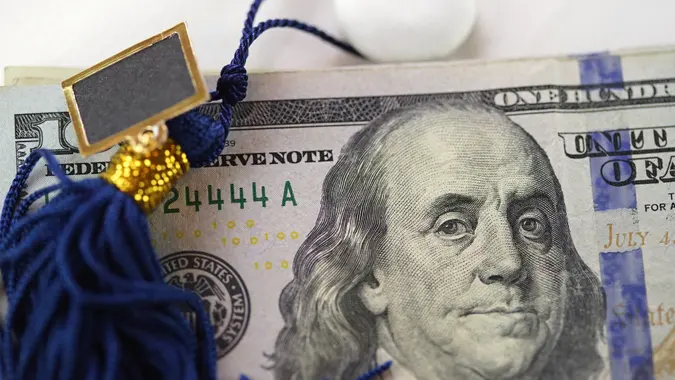As Student Loan Payments Resume, Scam Expert Offers How to Protect Yourself From Fraud

Commitment to Our Readers
GOBankingRates' editorial team is committed to bringing you unbiased reviews and information. We use data-driven methodologies to evaluate financial products and services - our reviews and ratings are not influenced by advertisers. You can read more about our editorial guidelines and our products and services review methodology.

20 Years
Helping You Live Richer

Reviewed
by Experts

Trusted by
Millions of Readers
It’s not been a great start to the summer for student loan borrowers – millions of whom were banking on the Biden administration’s plan to relieve their federal debt by up to $20,000. Unfortunately, the Supreme Court struck down that plan. Additionally, the moratorium on student loan repayments ends in the fall. This could pose a challenge to borrowers who’ve fully adapted to a financial life without this cumbrous bill.
Student Loans: An Ancient Rule Allows Biden To Forgive Student Loan Debt — No Matter What the Supreme Court Says
Learn: What To Do If You Owe Back Taxes to the IRS
But that’s not all the bad news for student loan borrowers. Scammers are also on the hunt, looking to lure borrowers into a trap of thievery.
The Main Scam
What are the federal student loan scams that are going around? What do they promise borrowers?
“For years, particularly since the Income-driven Repayment plans have been offered by the U.S. Department of Education, some federal student loan borrowers have been contacted and/or been taken advantage of by scammers,” said Jack Wallace, director-government and lender relations at Yrefy.
“Many borrowers who have been contacted have been promised lower monthly payments to loan forgiveness.”
Note that federal student loan borrowers may get direct mail, an email, a text and/or a phone call from these malicious actors.
How To Spot A Student Loan Scam
How can borrowers spot a student loan scam? Consider the grandiosity of the offer for student loan debt relief and the phishing for personal info.
“The scammers promise to eliminate or reduce the borrowers’ federal student loan debt by getting the borrower total forgiveness or a lower monthly Federal loan payment,” said Wallace. “The scammer may ask for the borrowers’ Social Security Number, their bank account information, their personal Federal Student Aid (FSA) login information, their Federal loan servicers portal such as email address and password and/or a Power of Attorney. The scammers may request that the borrower pay the scammer upfront fees that they say will go to lower or eliminate the borrowers’ monthly payments.”
Other manipulative tactics that loan scammers use include, according to Wallace, “impersonating the borrower with the borrowers’ servicer, and/or with FSA, lying on an Income-driven Repayment application and/or inflating the borrower’s household size in order to get a lower monthly payment.”
Reporting the Scam
“Federal student loan borrowers that spot a scam or are a victim of a scam should contact the following federal, state and/or non-profit agencies,” said Wallace. Here’s the list of ways to report a scam.
- The U.S. Department of Education (“ED”) in Washington, D.C. Go to www.ed.gov.
- The Consumer Finance Protection Board (“CFPB”) in Washington, D.C. Go to www.CFPB.gov and click on “Start a new complaint.”
- The Federal Trade Commission (“FTC”) in Washington, D.C. Go to www.FTC.gov and go to “Report to help fight fraud!” and click on “Report Now.”
- The Better Bureau in your state. Go to www.bbb.org and go to “Scam Tracker” and click on “Report a Scam.”
- Contact the State Attorney General in your state; and the State Consumer Affairs Department.
Student Loan Forgiveness: 10 Expenses To Cut From Your Budget When Payments Resume
Side Gig: Earn Up To $200/Hour With This Easy-To-Start Job, No College Degree Required
Work with Trusted Organizations
Rather than risk falling prey to a scammer, student loan borrowers should look into organizations that are in good standing with the Better Business Bureau and with their state of incorporation.
“These companies are willing and able to help federal borrowers get through the new and complicated income-driven repayment plan called Saving on A Valuable Education (“SAVE”) process announced by the Biden Administration on June 30,” said Wallace. “While the federal borrower can do the paperwork themselves, if time is money, there are some legitimate companies that may charge a fee of less than $500 to do the filing, processing and get successful results.”
 Written by
Written by  Edited by
Edited by 

























